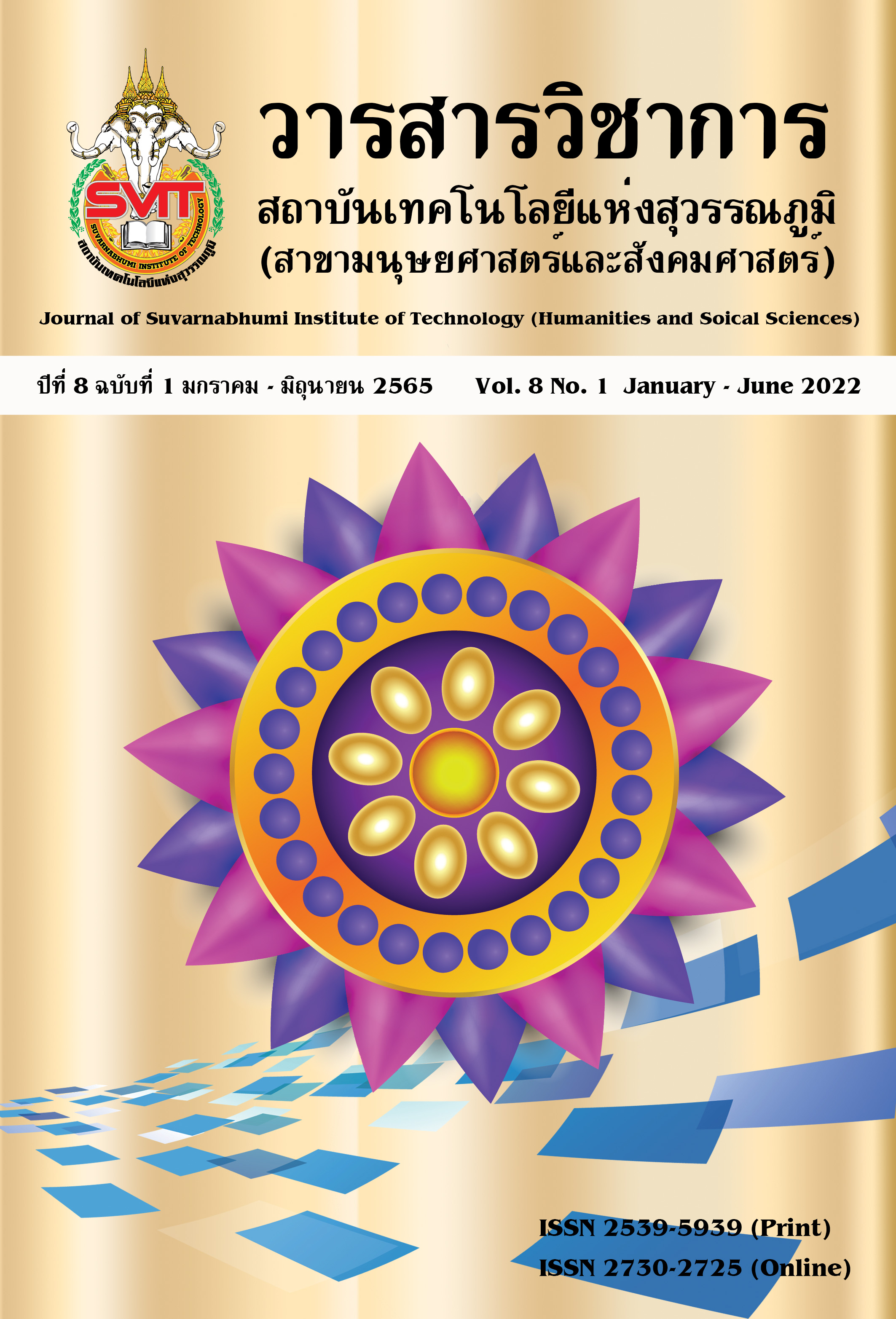A POSITIVE PSYCHOLOGICAL CAPITAL CORRELATION MODEL ON EMPLOYEE EFFECTIVENESS OF GEMS AND JEWELRY COMPANY EMPLOYEES IN ANYATHANI INDUSTRIAL ESTATE BANGKOK
Keywords:
Positive Psychological Capital, Performance Satisfaction, Employee Engagement, Performance EffectivenessAbstract
The objectives of this research is to 1) study the positive psychological capital level, performance satisfaction, employee engagement and employee effectiveness, 2) study employee engagement as the mediator between the positive psychology capital and the employee effectiveness, and 3) study employee engagement as the mediator between performance satisfaction and employee effectiveness of the employees of the gems and jewelry manufacturing companies in the industrial estate Anthani Industry Bangkok. The population and samples of this research are 175 employees of the gems and jewelry manufacturing companies in the industrial estate Anthani Industry Bangkok. The research tool was a questionnaire. The statistics used in this research consists of the frequency, percentage, mean and standard deviation values. The structural equation model (SEM).
As results, it was found that 1) employees of gem and jewelry manufacturing companies in the industrial estate Anthani Industry Bangkok have overall levels of positive psychological capital, performance satisfaction, employee engagement and employee effectiveness at a high level. The mean values were 4.29, 4.13, 4.25 and 4.22, and the standard deviations were 0.579, 0.637, 0.585 and 0.586, respectively; 2) employee engagement is the mediator between the positive psychology capital and the employee effectiveness with the lower bound coefficient of 0.226 and the upper bound of 0.490; and 3) employee engagement is mediator between performance satisfaction and employee effectiveness with the lower bound coefficient of 0.231 and the upper bound of 0.506. The results shown that the employee positive psychological capital results in the employee engagement. In the same manner, the performance satisfaction impacts employee engagement.
References
จักรกฤษณ์ ดวงพัสตรา. (2563). การวิเคราะห์ยุทธศาสตร์การพัฒนาอุตสาหกรรมอัญมณี และเครื่องประดับไทย. กรุงเทพ: จุฬาลงกรณ์มหาวิทยาลัย.
เจตลักษณา เสนีวงศ์ ณ อยุธยา. (2559). อิทธิพลของทุนจิตวิทยาเชิงบวกและบรรยากาศองค์การที่ส่งผลต่อคุณภาพการบริการโดยมีความผูกพันในงานเป็นตัวแปรส่งผ่านของพนักงานบริการโรงแมในจังหวัดราชบุรี (วิทยานิพนธ์ปริญญามหาบัณฑิต). กรุงเทพฯ: มหาวิทยาลัยศรีนครินทรวิโรฒ.
บริษัทผลิตอัญมณีและเครื่องประดับ. (2564). ข้อมูลจำนวนพนักงานบริษัท. กรุงเทพฯ: ฝ่ายบุคคล.
วัลยา ชูประดิษฐ์. (2560). ความสัมพันธ์เชิงสาเหตุของบรรยากาศองค์การ พฤติกรรมการเป็นสมาชิกที่ดีต่อองค์การและความผูกพันของพนักงานกับประสิทธิผลองค์การของธุรกิจบริการ. วารสารวิชาการบริหารธุรกิจ สถาบันอุดมศีกษาเอกชนแห่งประเทศไทย, 6(2), 31-47.
สุพรรษา ลอยสมุทร. (2559). การศึกษาความสัมพันธ์ระหว่างความพึงพอใจในการปฏิบัติงานของครูผู้สอนกับประสิทธิผลของสถานศึกษาเอกชน ในจังหวัดระยอง จันทบุรี และตราด. (วิทยานิพนธ์ปริญญาครุ ศาสตรมหาบัณฑิต). จันทบุรี: มหาวิทยาลัยราชภัฏรำไพพรรณี.
สุมาลินี มุธรพจน์พงศ์. (2555). ความหวัง การมองโลกในแง่ดี และความสามารถฟื้นคืนได้: ตัวแปรทำนายผลงาน ความพีงพอใจในงาน ความสุขในการทำงาน และความผูกพันกับองค์กร (วิทยานิพนธ์ปริญญามหาบัณฑิต). กรุงเทพฯ: จุฬาลงกรณ์มหาวิทยาลัย.
อินโฟกราฟิกการค้าอัญมณีและเครื่องประดับของไทย. (2563). สถานการณ์นำเข้าส่งออกอัญมณีและเครื่องประดับไทย. สืบค้น 5 เมษายน 2565, จาก https://infocenter.git.or.th/
อุทุมพร รุ่งเรือง. (2555). ความพึงพอใจในการทำงาน ที่มีผลต่อความผูกพันต่อองค์กรของพนักงานบริษัทอุตสาหกรรมแปรรูปโครงสร้างเหล็ก (วิทยานิพนธ์ปริญญามหาบัณฑิต). กรุงเทพฯ: มหาวิทยาลัยศรีนครินทรวิโรฒ.
Hair, J. F., Anderson, R. E., Tatham, R. L., & Black, W. C. (1998). Multivariate data analysis. (5th ed.). New York: Prentice-Hall.
Kataria, A., Garg, P., & Rastogi, R. (2013). Organizational effectiveness as a function of employee engagement. South Asian Journal of Mangement, 20(4), 57-73.
Rahman, H. (2014). Training and job satisfaction for organizational effectiveness: A case study from the banking sector. Journal of Central European Business Review Research Papers, 3(1), 27-34.
Ramanus, S., & Boonyoo, T. (2020). The structural influence of factors affecting the success of Thailand transporation and logistics business. Academy of Strategic Management Journal, 19(6), 1-9.
Tepayakul, R. & Rinthaisong, I. (2018). Job satisfaction and employee engagement among human resources staff of thai private higher education institutions. The Journal of Behavioral Science, 13(2), 68-81.
Downloads
Published
Issue
Section
License
Copyright (c) 2022 Suvarnabhumi Institute of Technology

This work is licensed under a Creative Commons Attribution-NonCommercial-NoDerivatives 4.0 International License.
The articles published are copyrighted by the Sarasas Journal of Humanities and Social Science. The opinions expressed in each article in this academic journal are those of the individual authors and do not reflect the views of Sarasas Suvarnabhumi Institute of Technology. The authors are solely responsible for all aspects of their respective articles. Any errors or inaccuracies in the articles are the sole responsibility of the authors.



